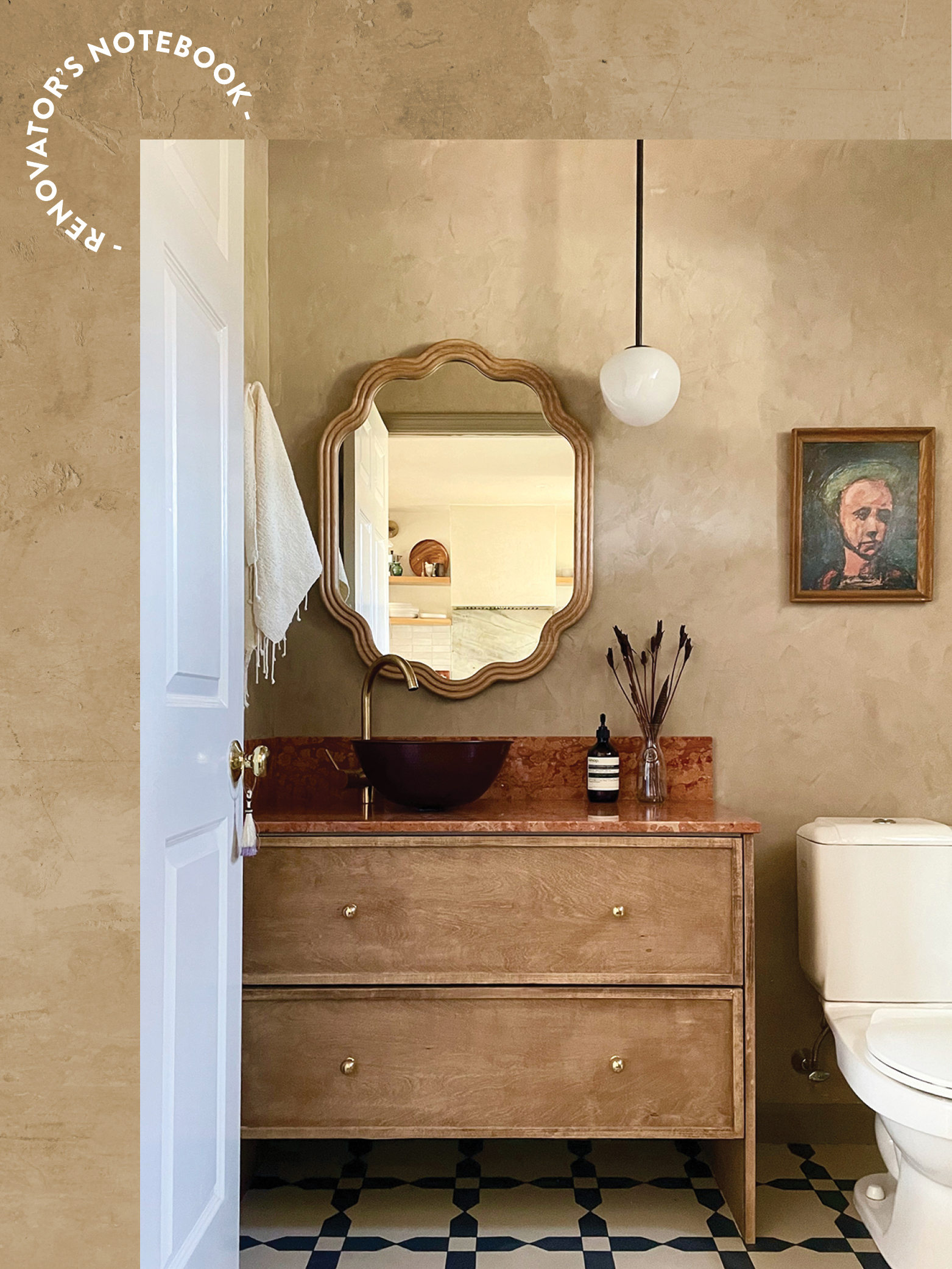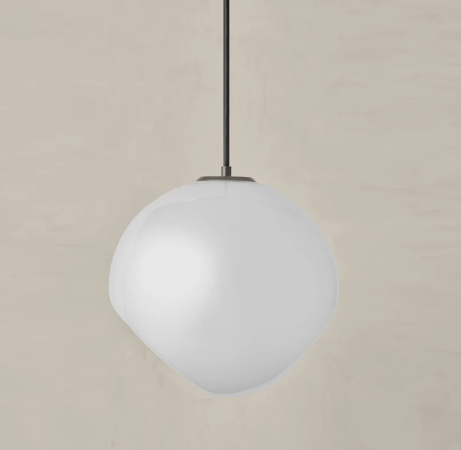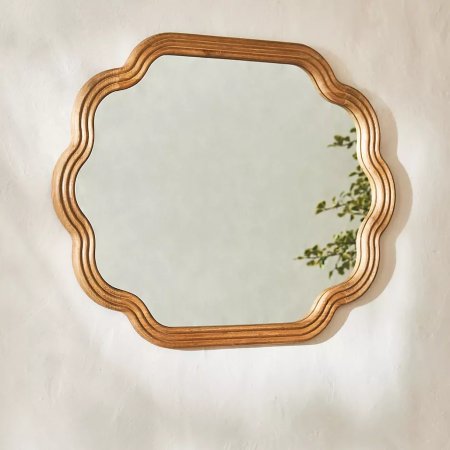We may earn revenue from the products available on this page and participate in affiliate programs.
In Renovator’s Notebook, homeowners open up about the nitty-gritty of their remodels: How long it really took; how much it actually cost; what went horribly wrong; and what went wonderfully, serendipitously, it’s-all-worth-it-in-the-end right.
The first time interior designer Shannon Tate-Giordano made over the powder room in her Massachusetts home, in 2017, she set out to spend the least amount of money that would make the biggest visual impact. She painted the builder-grade vanity black and tacked on some side cubbies for extra storage, painted the floor in a way that made it look tiled, and hung an extra-large round mirror. “I got supercrafty, and I was happy with it,” she says. But fast-forward six years and the inevitable (if you’re a designer, anyway) happened. It didn’t feel like her anymore: “I like things to be a little bit more refined now.”

This go-round, Tate-Giordano set out to spend a little more money on the project. She specifically had her heart set on hand-painted Moroccan floor tile. Her house, though, had other plans for her budget. As she began to prep the floors for reno 2.0, a valve burst, spewing water all over the bathroom floor and into the basement ceiling. As she and her plumber began pulling out the insulation downstairs to air it out, they discovered preexisting mold damage—a problem that came with a steep $30,000 price tag to fix. “It totally threw everything off,” recalls the designer. She moved forward with the powder room project, but with limited funds to dedicate to the space, she decided to go the DIY route once again.
The Receipts

Tate-Giordano estimates that her original plan of installing Moroccan floor tile would have run her around $4,000 for materials and labor. By skipping that step and deciding to tackle the new vanity and Roman Clay walls herself, she suspects she shaved off nearly $9,500. The only jobs she hired out were to a plumber to do the sink hookup and to an electrician to install her pendant light in a new location. Her total cost came in just under $3,000, excluding a $680 pendant she received for free.
Here’s a look at some of the materials she ended up purchasing along the way.
- Anthropologie mirror: $398
- Rejuvenation drawer pulls x 4: $80
- Etsy faucet: $250
- Etsy sink drain: $70
- Portola Paints wall finish: from $28
- Bed Bath & Beyond sink: $148
- IKEA vanity: $350
- Hennepin Made light: gifted (usually $680)
Ahead, in her own words, she looks back at her budget-friendly revamp.
Fake the Look of Tile With Stencils


Because the existing floor is Marmoleum (a water-resistant and sustainable alternative to linoleum), I was able to dry it out enough so that I could glue it back down, sand it, and prime it for paint (it takes paint very well!). Then I cut a star-shaped stencil out of card stock with a razor blade. I used a Sharpie to outline the design and ended up eyeballing it because I have very little patience for a level—I think it looks pretty straight. I filled in the shapes with a mix of colors in Benjamin Moore’s Porch and Floor Paint Finish. It took a while…my back was killing me.
Start With an IKEA Vanity Base


The old vanity was nothing to write home about, and the cabinet was impractical for storage. I definitely wanted to switch to having drawers. Not wanting to build something from scratch, I bought an IKEA Godmorgon vanity for the shell and custom-made the sides and the drawer fronts out of walnut-stained plywood with a solid wood trim.
A local stone yard in western Massachusetts had three full slabs of this red travertine, and they told me they’d had it for nearly 15 years. Nobody wanted to buy it! The slabs were three-quarter-inch—the perfect thickness for my vanity. It was a total score.
Double-Check Your Drainage


I was looking on Pinterest and watching videos of how people turn bowls into sinks, and I was like, Yeah, I’ll do that. I went to HomeGoods and found a bowl that was the perfect color. (It was similar to a $500 concrete sink I was eyeing on Etsy.) I felt so smart and so accomplished; I even drilled it for the drain and had the plumber come in and hook everything up once the countertops were in.
Then, an hour later, I tried it out. All the water was staying inside the bowl. I was so annoyed with myself. Of course, this wasn’t make any sense; why would it drain? The pitch wasn’t high enough. I thought maybe I’d just order the $500 sink, but then I found this hammered copper one at Bed Bath & Beyond and really liked the way it looked. I switched to that, and it was supereasy. I actually figured out how to change the plumbing and I didn’t have to hire someone twice to do it.
Amp Up the Wall Texture With Roman Clay

I had used this Portola Paints color, Rustic, on another project recently, and I thought it was a really nice combination with the warm red travertine counters. I prefer Roman Clay over limewash; it has this really smooth, buttery finish. I applied three coats with a metal trowel to make sure I couldn’t see any of the wall underneath, then added a sealer.
Find Balance by Going Off Symmetry

Hennepin Made reached out to me and offered its Lacuna globe pendant light. Because all of the plumbing is skewed to the left of the mirror, I thought it would be cool to hang the fixture to the right, to fill that void. It’s not a bathroom that I do my makeup in, so it didn’t have to be bright. I wanted it to feel more like a hotel.
I reused my existing art; I felt like it still fit. I started frequenting an antiques shop when we first moved here.
In the end, I’m actually way happier with how these cost-saving measures look. I like them way more than my original plan, so it’s very satisfying.





